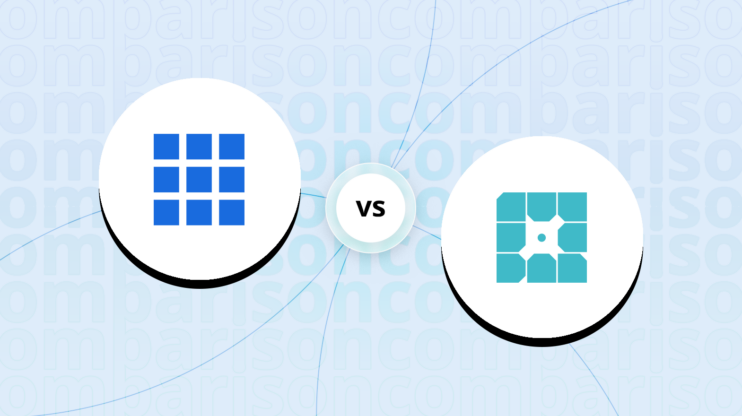Namecheap vs Domain.com: Final verdict
Looking over Namecheap vs. Domain.com, it’s clear why both hosts are so popular. They have both hosted millions of
websites that run on WordPress for decades, building up a loyal customer base.
Namecheap (Overall grade: 7.2)
excels in providing high uptime, faster loading times, and extensive security features across its hosting plans. Its wide range of hosting types includes advanced options like VPS and Ecommerce hosting, which Domain.com lacks. Namecheap’s superior performance metrics, SSD storage, free CDN integration, and multiple global data centers enhance site speed and reliability. Their cPanel and EasyWP dashboard cater to both technical and non-technical users, making it an appealing option for a broader audience. Despite minor concerns about occasional slow support response and shared hosting speeds, its competitive pricing and rich feature set make it an attractive choice for small to medium businesses.
Domain.com (Overall grade: 6.5)
focuses on simplicity and ease of use, making it ideal for beginners and users seeking a straightforward hosting experience. It offers integrated tools like a drag-and-drop website builder and AI-powered setup options but falls short on advanced features and specific performance metrics. While Domain.com provides solid customer support through 24/7 phone and live chat services, it struggles with maintaining promised uptime and has slower response times. The platform offers a free domain for the first year, appealing to cost-conscious users, but the lack of certain advanced functions and the absence of reseller plans may limit its appeal to more sophisticated users.
 Overall grade:7.2 |
 Overall grade:6.5 |
|
|---|---|---|
| Uptime and Availability | 8.0 | 3.2 |
| Hosting Performance | 8.2 | 5.3 |
| Hosting Security | 8.5 | 7.9 |
| Price | 8.7 | 8.1 |
| Hosting Features | 7.5 | 5.8 |
| Ease Of Setup | 8.8 | 7.7 |
| User Management | 0.0 | 7.2 |
| Customer Support | 8.0 | 7.1 |
| User feedback | 4.3/5 | 3.2/5 |
Hosting types offered
Both platforms provide a variety of hosting types, each designed to meet the different needs of users.
 |
 |
|
|---|---|---|
| Shared hosting | ||
| Cloud hosting | ||
| WordPress hosting | ||
| Ecommerce hosting | ||
| VPS hosting | ||
| Dedicated hosting |
Although both offer a variety of hosting plans tailored to different needs, in
certain cases, one platform may prove to be more suitable.
Detailed comparison
Uptime and availability
Evaluates the average uptime statistics, uptime guarantee and overall availability of the hosting
provider
Score Components:
- Uptime percentage (30%): evaluates the uptime statistics in given period of time
- Uptime guarantee (20%): Assesses if the platform offers an uptime guarantee and
whether the actual uptime matches the promised guarantee. - General performance (25%): Evaluates how fast is the average response time and overall
it’s stability. - Responsiveness (10%): Adaptability to different devices and screen sizes.
- Availability (25%): Reflects the total downtime and number of outages.
 8.0
8.0
 3.2
3.2
Winner Namecheap: Namecheap offers better overall uptime and response times compared to Domain.com.
🏆 Winner Namecheap: Namecheap offers better overall uptime and response times compared to Domain.com.
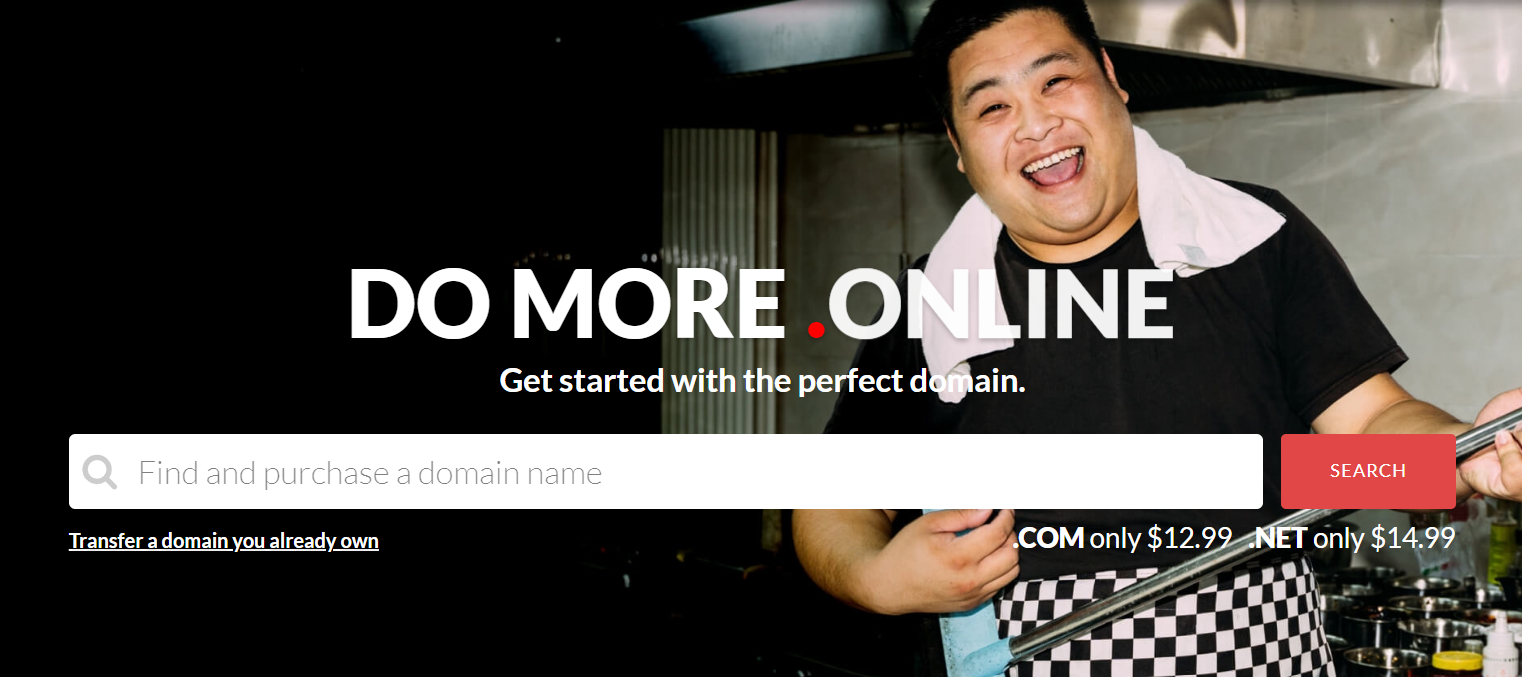
Namecheap boasts a 100% uptime guarantee for shared, business, and dedicated server accounts, and a 99.9% guarantee for reseller, VPS, and EasyWP managed WordPress hosting. Actual performance tests have shown impressive results, with an average uptime of 99.96% and only occasional minor downtimes. Their response time, albeit below market average, remains within acceptable limits, cementing their position as a reliable hosting provider.

Domain.com, while claiming a 99.99% uptime guarantee, has struggled to meet this promise in actual performance tests. Over two weeks, its uptime varied between 98% and 99.11%, raising concerns about its reliability. Additionally, Domain.com’s response times are slower, averaging 2.97 seconds during tests, which could affect user experience negatively. Hence, Namecheap stands out as the superior choice in terms of uptime and availability.
Which one has better hosting performance?
Score Components:
- Hosting speed (30%): This includes SSD quality, Load times, PageSpeed score ranges,
additional information on website speed, built-in plugins for performance enhancement, available caching
methods, and CPU/RAM options - CDN (20%): Considers whether CDN is available or not, whether it’s free or paid, and
the quality of the CDN service - Available data centers (30%): Evaluates the number of data centers and their locations
globally. - Scalibility (20%): Looks at whether elastic scaling is available, the process required
to scale (manual upgrade vs. automatic scaling), the presence of dedicated servers, and the costs
associated with scaling.
 8.2
8.2
 5.3
5.3
🏆 Winner Namecheap: Versatile hosting with better overall performance.
Namecheap and Domain.com offer different levels of performance and features that can cater to various needs. Namecheap provides faster loading times with SSD storage across all plans, including VPS and WordPress hosting. This makes for quicker file access and better overall site speed. Domain.com utilizes a drag-and-drop builder for easy site creation but offers limited SSD storage compared to Namecheap’s options. Namecheap also has free CDN and multiple global data centers, enhancing site speed and reliability, while Domain.com includes a free domain for the first year and offers SSL only for the first year.
Website Speed
Namecheap significantly outperforms Domain.com in terms of website speed. With a fully loaded time of just 0.7 seconds and a swift time to first byte at 192 milliseconds, Namecheap ensures rapid site access. In contrast, Domain.com does not provide specific speed metrics, making Namecheap the safer bet for faster load times. Namecheap also integrates caching methods and free CDN support to further enhance speed, which Domain.com lacks.
Scalability
Namecheap allows for scalable hosting solutions with a variety of plans, including shared, VPS, and reseller hosting. Upgrading is straightforward, given the variety of plans available, but automatic elastic scaling is not specified. Their broad offering of resources, such as higher SSD storage and CPU cores, makes it easier to scale up. On the other hand, specific details about Domain.com’s scalability and dedicated server offerings are unclear.
Overall, Namecheap’s superior performance metrics and flexible plans make it a better choice for most users.
Which one has better security features?
and regulatory requirements
Score Components:
- Technical security measures (40%): This includes encryption, firewalls, DDoS
protection, secure configurations, server monitoring, access control and availability of security addons
(e.g Sitelock security). - Operational security measures (30%): Encompasses data privacy, backups and data
redundancy. - Compliance and certifications (20%): Adherence to legal and regulatory requirements
(e.g., GDPR, HIPAA) and possession of certifications (e.g., ISO 27001, SOC 2). - Business and reliability (10%): Factors in the provider’s reputation, uptime
guarantees, and customer support.
 8.5
8.5
 7.9
7.9
🏆 Winner Namecheap: Offers an extensive array of security features and operational support.
Technical security measures:
Namecheap provides a variety of SSL certificates, including Domain Validation, Organization Validation, and Extended Validation, along with Single Domain, Wildcard, and Multi-domain options. Namecheap supports PHP versions from 5.X to 8.X. Domain.com also boasts a range of SSL certificates, including Domain, Organization, and E-commerce SSL, as well as Wildcard SSL, but does not explicitly mention the supported PHP versions. Domain.com offers SiteLock security for malware protection, whereas Namecheap employs a ClamAV Virus Scanner for similar purposes.
Operational security measures:
Namecheap includes Two-Factor Authentication (2FA), PremiumDNS, and FastVPN for robust security. It also offers email protections like Jellyfish Spam Protection, BoxTrapper, and IP Deny Manager. Domain.com focuses on SiteLock security measures such as Automatic Malware Removal, Blacklist Monitoring, and DDoS Protection. Both providers offer domain privacy protection to maintain user’s anonymity.
Compliance and certifications:
Both Namecheap and Domain.com are GDPR compliant, offering rights like access, rectification, deletion, restricted processing, data portability, and objection. Namecheap’s compliance with HIPAA is not specified. Domain.com requires PCI compliance for accepting credit card information, and Namecheap offers features that can help meet PCI requirements but doesn’t state explicit compliance.
 |
 |
|
|---|---|---|
SSL certificate |
Yes |
Yes |
Additional security features |
Yes |
Yes |
PHP versions |
PHP 5.X to 8.X |
Not specified |
GDPR compliance |
Yes |
Yes |
HIPAA compliance |
Not specified |
Not specified |
PCI compliance |
Yes |
Yes |
Hosting features
Score Components:
- Domains (20%): Assesses the availability of a free domain, domain purchase options, and
pricing - Email (15%): Considers if the provider offers full email hosting, or is reselling
third-party service, and if the email is only transactional or not - Website builder (15%): Checks if website builder is available, and it’s user
friendliness and overall the level of customization allowed. - Staging environment (20%): Determines if a staging environment is available, allowing
for testing changes before going live. - FTP & SFTP accounts (10%): Evaluates if and how easily users can access FTP and
SFTP accounts - Git and SSH access (20%): Assess whether Git is integrated into the hosting service and
if SSH access is provided
 7.5
7.5
 5.8
5.8
🏆 Winner Namecheap: Cost-effective and feature-packed hosting solutions suitable for a variety of needs.
When comparing Namecheap and Domain.com, both hosting providers bring solid features to the table, but there are notable differences. Namecheap offers a website builder across all its shared hosting plans, which can be attractive to users looking for easy website creation without a steep learning curve. This is further bolstered by Namecheap’s inclusion of free SSL certificates, plentiful SSD storage options, and a complimentary Supersonic CDN. They also provide free website migration and have multiple datacenter locations, which contributes to their user friendliness and performance reliability.
Domain.com, on the other hand, focuses on simplicity and scalability with unlimited bandwidth and storage. They offer a drag-and-drop website builder, making it easy for users to create and customize their sites without prior coding knowledge. Domain.com also includes a free domain for the first year with a promo code, which can save users some upfront costs. However, there is no specific mention of SSH availability, which may be a drawback for users needing secure server access. While Domain.com provides various hosting types, from shared to dedicated, the lack of certain advanced features potentially limits its appeal to more tech-savvy individuals.
 |
 |
|
|---|---|---|
Free domain |
No |
Yes, for the first year |
Free SSL |
Yes, for the first year |
Yes, for the first year |
Email hosting |
Yes |
Not specified |
Website builder |
Yes |
Yes |
Staging environment |
Yes |
Not specified |
FTP & SFTP account |
Yes (includes SSH) |
Yes |
Git and SSH access |
Yes |
FTP only |
Free backup |
Yes |
Not specified |
Money back guarantee |
30 days |
Not specified |
a location.
As a result in rare cases the features mentioned here can differ from the ones you see on their websites.
Both providers support a range of users from beginners to experts with user-friendly website builders and WordPress staging areas. However, in terms of developer tools, both Namecheap and Domain.com offer robust options including SSH access, support for multiple programming languages, and Git for version control, thus appealing to developers looking for advanced capabilities.
Email services:
Namecheap excels with its comprehensive email hosting services, offering up to 30 mailboxes with its basic plan and unlimited mailboxes with the higher-tier plans, alongside features like email autoresponders, spam protection, and webmail options. Domain.com’s email services are not explicitly detailed, which suggests that potential users may need to reach out directly for specifics. This might include basic transactional email services or an option to integrate third-party services like Google Workspace. Overall, for those prioritizing extensive email features and ease of setup, Namecheap stands out as the better option.
Price
Score Components:
- Plan value (40%): What each pricing tier offers.
- Transparency and clarity (30%): Clearness of pricing structures.
- Flexibility of plans (20%): Range of options to suit different budgets.
- Hidden costs (10%): Additional expenses not included in the plan.
 8.7
8.7
 8.1
8.1
🏆 Winner Namecheap: Offers an extensive range of features at a competitive price.
Evaluating the pricing of plans among various hosting providers can be complex due to their differing pricing and renewal strategies. Additionally, certain plans require annual commitments, which adds to the difficulty of making comparisons. The prices listed are based on monthly commitments; plans requiring annual commitments are indicated. Additionally, although some providers offer identical plans for WordPress and shared hosting, we have created separate tables for each to enhance clarity.
When comparing Namecheap and Domain.com, Namecheap’s shared hosting plans offer low introductory prices with various features like free Supersonic CDN, website migration, and a website builder. Domain.com provides uniform pricing across its basic, plus, and premium plans, with features like unmetered bandwidth, drag-and-drop builder, and free SSL for the first year. Namecheap’s Managed WordPress hosting starts at competitive rates and includes free CDN and SSL, while Domain.com has flat pricing for multiple durations and includes a free domain with SSL. For reseller plans, Namecheap’s pricing varies based on the number of cPanel accounts and SSD storage, while Domain.com does not offer reseller hosting in their plan comparisons.
 |
 |
|---|---|
|
EasyWP Starter $6.88
1 website, 10 GB SSD storage, 50k visitors/month, free CDN, free SSL. Value for price:9.0
|
Basic Plan $3.75
1 website, 10GB Web Storage, 15K Visitors, free domain for the first year, free SSL for the first year. Value for price:8.5
|
|
EasyWP Turbo $12.88
1 website, 50 GB SSD storage, 200k visitors/month, free CDN, free SSL. Value for price:9.2
|
Plus Plan $3.75
5 websites, 20GB Web Storage, 50K Visitors, free domain for the first year, SSL Certificate included. Value for price:8.6
|
|
EasyWP Supersonic $19.88
1 website, 100 GB SSD storage, 500k visitors/month, free CDN, free SSL. Value for price:9.5
|
Premium Plan $3.75
10 Websites, 40GB Web Storage, 200K Visitors, unlimited bandwidth, free domain for the first year, SSL Certificate included. Value for price:8.8
|
 |
 |
|---|---|
|
Stellar $4.48
3 websites, 20 GB SSD, free domain, free SSL. Value for price:8.5
|
Basic Plan $3.75
1 website, 10GB Web Storage, 15k visitors, unmetered bandwidth, free domain, free SSL for the first year. Value for price:8.1
|
|
Stellar Plus $6.48
Unlimited websites, unmetered SSD, free domain, AutoBackup. Value for price:9.0
|
Plus Plan $3.75
5 websites, 20GB Web Storage, 50k visitors, unmetered bandwidth, free domain, SSL Certificate included. Value for price:8.2
|
|
Stellar Business $9.48
Unlimited websites, 50 GB SSD, free domain, AutoBackup & Cloud Storage. Value for price:9.3
|
Premium Plan $3.75
10 Websites, 40GB Web Storage, 200k visitors, unlimited bandwidth, free domain, SSL Certificate included. Value for price:8.6
|
 |
 |
|---|---|
|
N/A
|
N/A
|
Enterprise plans
For enterprise needs, Namecheap offers Advanced Dedicated Servers that can be customized for high-traffic websites, content streaming, and other demanding applications, with full root access and 24/7 support. Domain.com does not provide specific dedicated server plans in this comparison, making Namecheap the more suitable option for enterprise-level hosting requirements.
Namecheap vs Domain.com: Ease of setup
platform.
Score Components:
- Site migration (25%): Assesses whether the provider offers tools for site migration,
either automated or manual, and whether these services are free or require a fee. - Admin panel usability (35%): Evaluates the type of admin panel provided, such as the
standard cPanel or a custom solution, focusing on its accessibility and user-friendliness for both
technical and non-technical users. - Setup features (20%): Examines the availability and ease of use of various setup
features, including FTP accounts, file managers, email account setup, PHPMyAdmin, and easy CDN
configuration. - Help center quality (20%): Measures the quality and accessibility of the provider’s
help center resources, including articles and tutorials.
 8.8
8.8
 7.7
7.7
🏆 Winner
Namecheap: User-friendly setup process and extensive support make it the top choice for hosting.
Namecheap uses a combination of cPanel for more advanced users and a simplified EasyWP dashboard for WordPress hosting. This dual-option caters to both technical and non-technical users by providing a familiar, feature-rich environment for experienced users and an easy-to-navigate interface for those less savvy. Namecheap’s Softaculous app installer furthers this accessibility by enabling quick installations of popular content management systems and other scripts. On the other hand, Domain.com offers a more integrated approach with a custom control panel designed to simplify tasks. It also includes a drag-and-drop website builder and an AI-powered option for expedited setups. While Domain.com’s approach is streamlined for beginners, it may lack the depth of control that more advanced users seek, making Namecheap’s flexible offering more suitable for a wider range of users.
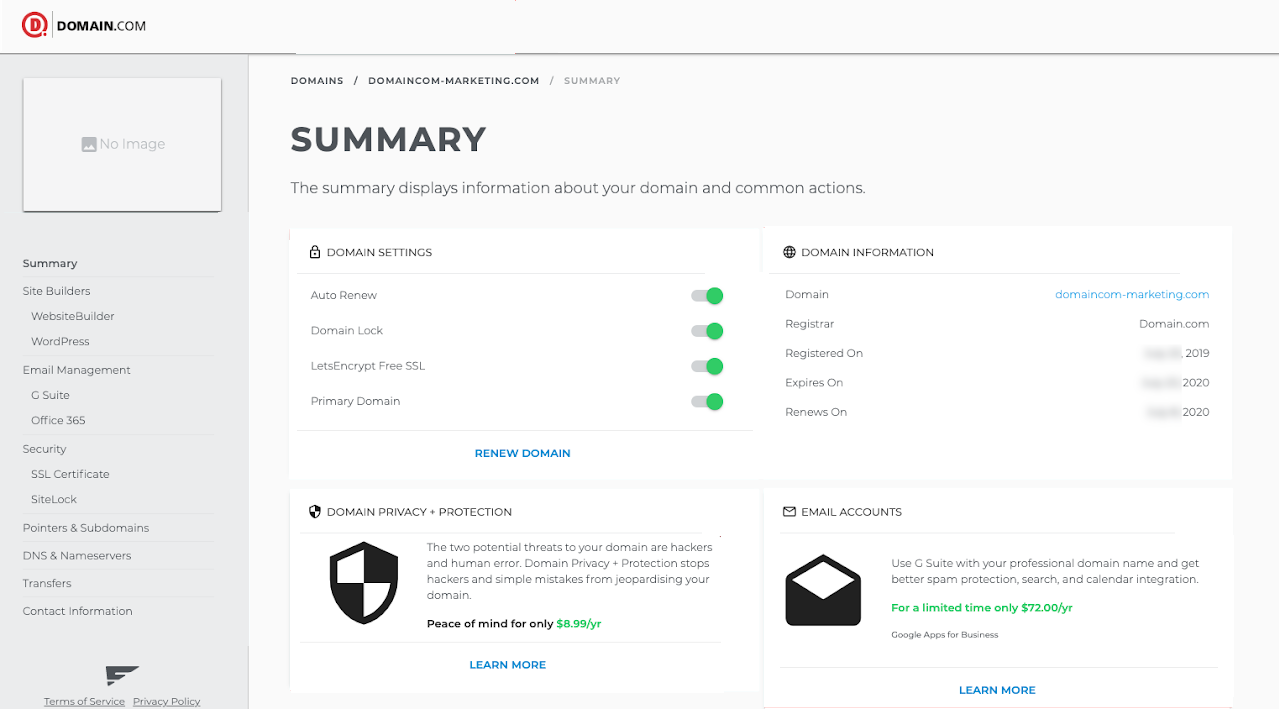
Namecheap provides free website migration services through their support team, using the All-in-One WP Migration plugin. This service is available for migrations from various hosts and is free of charge. Domain.com also offers migration tools, but the details about any associated costs or the level of automation provided are not as clear. Based on the available information, Namecheap provides a more transparent and straightforward migration experience.
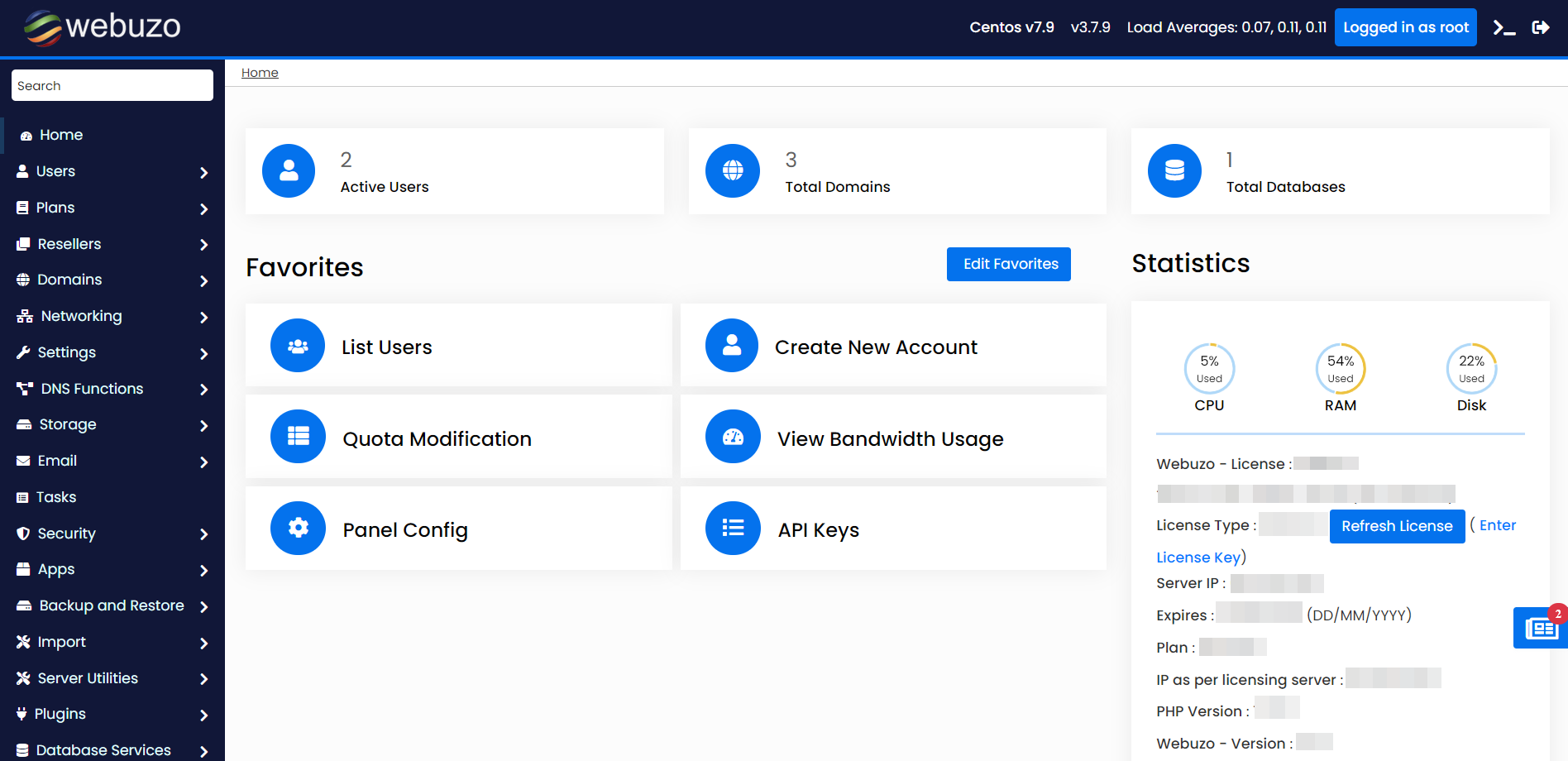
Namecheap offers a comprehensive help center, including 24/7 live chat, an extensive Knowledgebase, and a secure support ticket system to ensure all user queries are efficiently resolved. Domain.com also has a robust support system with a 24/7 live chat and a detailed Knowledge Base, but it doesn’t quite reach the same level of detail and accessibility found in Namecheap’s resources. Users looking for extensive help and support would likely find Namecheap’s offerings more comprehensive and reliable.
The platforms provide extensive knowledge bases filled with guides, how-to articles, and instructional content. Namecheap offers a wide range of resources alongside 24/7 chat and phone support. Domain.com also boasts a detailed help center with an intuitive search function and around-the-clock support via live chat, phone, and ticketing, ensuring comprehensive user support.
User management
accessibility.
Score Components:
- Role customization (40%): Flexibility in creating and defining user roles and
permissions. - Ease of management (30%): User interface and tools for managing users.
- Access control (20%): Effectiveness of access control measures for different user
levels. - Scalability (10%): Ability to manage a growing number of users efficiently.
 0.0
0.0
 7.2
7.2
🏆 Winner: Domain.com: Provides efficient user management and access control capabilities for WordPress sites.
When comparing Namecheap and Domain.com in terms of managing user roles, permissions, and accessibility, Domain.com clearly stands out. Domain.com offers refined user roles such as Administrator, Editor, Author, Contributor, and Subscriber, each explicitly defining responsibilities and access levels. These roles accommodate diverse user needs, from full site management to content contribution, ensuring granular control over permissions and improving overall site security. Namecheap, lacking documented user management features, does not offer comparable flexibility or control.
The user interfaces for managing users differ significantly between the two hosting providers. Domain.com presents an intuitive dashboard, making it straightforward to add and manage users. The simplicity of navigating through the menu to create or edit user roles enhances the overall user experience. On the other hand, the specifics of Namecheap’s user management tools are not provided, leaving us to assume potential limitations in ease of use compared to Domain.com.
Access control measures are crucial for managing a growing website, and Domain.com performs effectively in this respect. Incorporating a variety of roles ensures that administrators can delegate responsibilities without compromising security. Domain.com’s ability to handle increasing numbers of users seamlessly through its user-friendly interface and detailed access levels proves advantageous. Without corresponding data, Namecheap’s capacity to similarly manage user access remains unverified.
Domain.com user roles table:
| Role | Description | Access highlights |
|---|---|---|
| Administrator | Full administrative access to the site. | Manage all site functions, including roles of other users. |
| Editor | Manages, edits, and publishes all posts. | Edit, delete, and publish posts created by any user; content-focused. |
| Author | Creates and manages personal posts. | Write, edit, publish, and delete their own posts; can upload files. |
| Contributor | Writes and edits own posts without publishing rights. | Write and edit posts; cannot publish or delete posts, needs higher-role approval. |
| Subscriber | Limited to reading posts and personal profile updates. | View content and manage personal profiles. |
Customer support
hosting provider.
Score Components:
- Support communication channels (30%): Measures the variety of customer support types
provided (live chat, chatbot, email, phone, etc.) - Availability (20%): Assesses the availability hours for each channel, including 24/7
support options. - Technical support quality (30%): Assesses whether the provider offers comprehensive
technical support, including hardware upgrades (e.g., HDD to SSD), software installations, and web
server configuration changes. - Enterprise support (20%): Checks if there are dedicated or priority support services
for enterprise-level customers.
 8.0
8.0
 7.1
7.1
🏆 Winner Namecheap: Offers a wide range of customer support options with positive and professional interactions.
 |
 |
|
|---|---|---|
Phone support |
||
Live chat support |
||
Chatbot |
||
Email/ticket support |
||
Enterprise support (dedicated agent, priority support) |
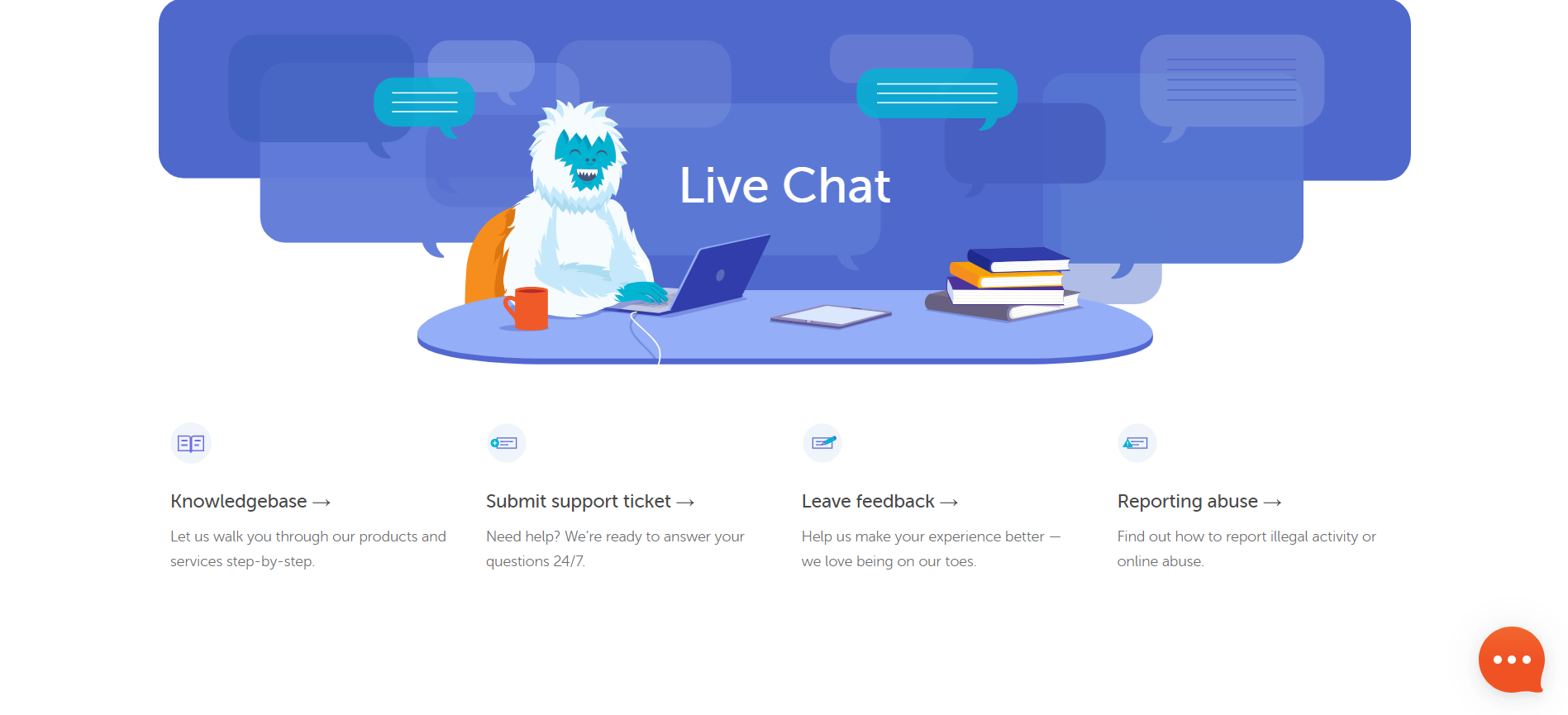
Both Namecheap and Domain.com provide 24/7 live chat support, although Namecheap excels in support resources with its extensive Knowledge Base and diverse Guru Guides. Namecheap also includes a 24/7 ticketing system and offers impressive migration services. Users often find their live chat swift and professional, forming a pleasant customer experience despite the absence of phone support.
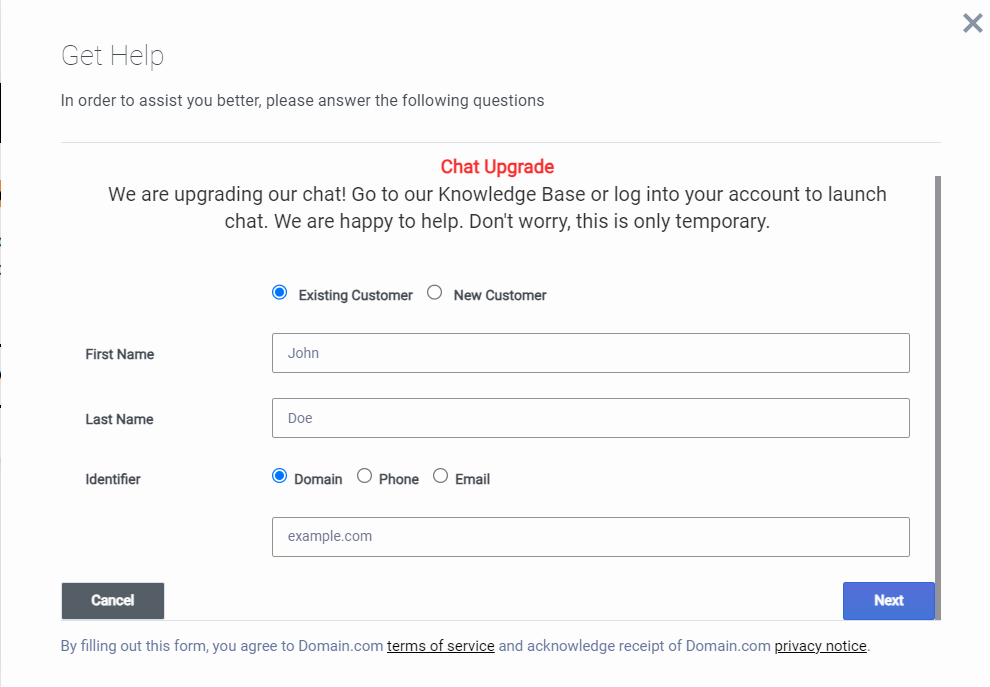
Domain.com distinguishes itself with 24/7 phone support, promising quick connection times with representatives. Their uptime guarantee is appealing, and there’s a straightforward refund policy. However, some users have faced issues with response times and problem resolution. Overall, while Domain.com has solid phone and live chat options, Namecheap’s comprehensive resources and additional support features make it the stronger choice.
Namecheap vs Domain.com: User feedback
Namecheap is widely appreciated for its affordability, reliability, and high-quality customer support. Users commend the availability of free SSL certificates, user-friendly cPanel, and outstanding hosting speed. However, shared hosting speed and the occasional slow response from support are noted concerns. Despite these minor drawbacks, Namecheap remains a popular choice for beginners and small to medium businesses due to its competitive pricing and satisfactory service quality.
User feedback for this hosting provider reveals a mixed experience. Many users appreciate its user-friendly platform, straightforward domain registration process, and reliable customer support. However, significant criticisms include poor customer service practices, confusing pricing and add-ons, and outdated or slow web interfaces. While some users praise the affordability and efficiency of domain management, others warn of hidden costs and problematic service.
Namecheap vs Domain.com: FAQ
Which platform is better suited for hosting WordPress websites?
Namecheap and Domain.com both offer solid WordPress hosting with features like pre-installed plugins, themes, and easy management. However, Namecheap provides superior performance metrics, SSD storage, and free CDN integration, which can enhance the speed and reliability of WordPress sites. Therefore, while both are viable options, Namecheap might have an edge in overall performance for WordPress hosting.
Are both platforms suitable for beginners?
Yes, both Namecheap and Domain.com are suitable for beginners. Namecheap offers user-friendly dashboards like cPanel and EasyWP, making it accessible for non-technical users. Domain.com provides a drag-and-drop website builder and AI-powered setup options, which simplify the website creation process. Therefore, beginners can comfortably start using either platform.
Which hosting service offers better security features?
Namecheap offers a variety of security features, including multiple SSL certificates, ClamAV Virus Scanner, Two-Factor Authentication, and premium features like PremiumDNS and FastVPN. Domain.com also has solid security measures like SiteLock security for malware protection and DDoS Protection but does not specify supported PHP versions. Overall, Namecheap’s extensive security features make it the better option.
Which platform offers better customer support?
Both Namecheap and Domain.com offer 24/7 live chat support. Namecheap includes a comprehensive help center, a ticket system, and various guides, ensuring thorough assistance. Domain.com provides 24/7 phone support, making it easy to connect with representatives quickly. However, Namecheap’s extensive resources and additional support features make it a stronger choice.
Which hosting service offers more scalability options for growing websites?
Namecheap allows for scalable hosting solutions with a variety of plans, including shared, VPS, and reseller hosting. Upgrading is straightforward due to the multiple plans available and higher SSD storage and CPU core options. Domain.com’s scalability details are less clear, making Namecheap the better choice for those prioritizing easy scalability.
The making of this blog
We followed a clear, step-by-step process to write and research this article.









